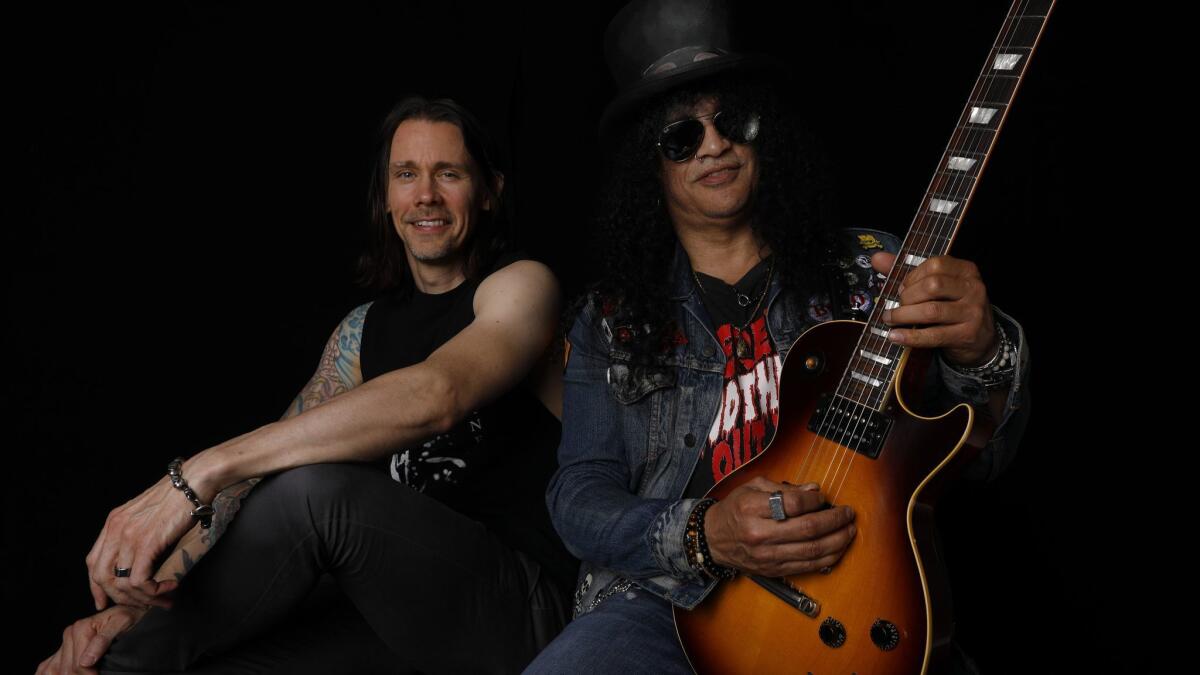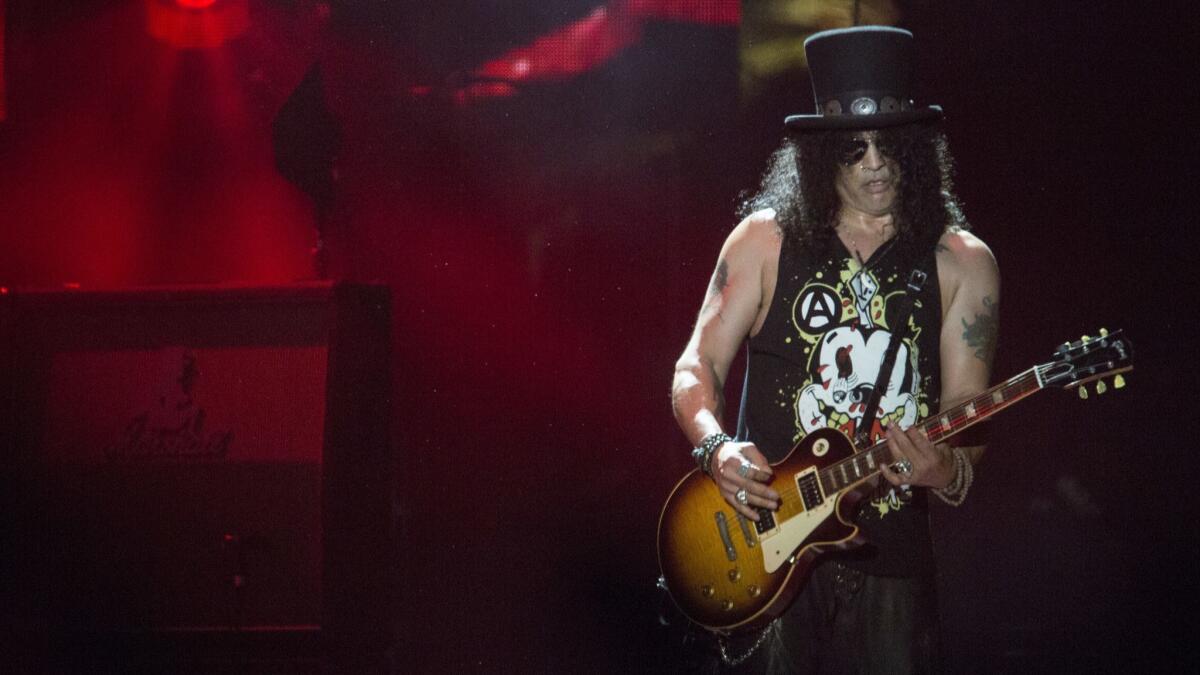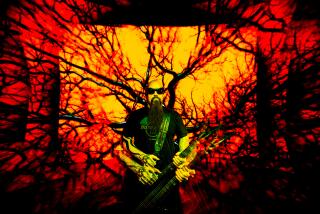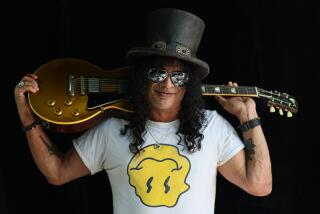Slash is back with the Conspirators, but won’t rule out a new Guns N’ Roses album

- Share via
Three years ago, Slash received an unexpected phone call that forced him to rethink everything.
At the time, the man born 53 years ago as Saul Hudson – who rose to fame in the late 1980s as the cigarette-dangling, Les Paul-playing, top hat-wearing lead guitarist of Guns N’ Roses – had spent more than a year touring the world in support of his third solo album.
With the tour winding down, the group, featuring vocalist Myles Kennedy and a band of backing musicians called the Conspirators, had started writing material for a new album. The plan was to record and release it in 2016.
Then the phone rang. And the artist, who had long traded rock ’n’ roll recklessness for stability and independence, was being asked to revisit his past.
The call set off an unlikely chain of events that would answer the prayers of hard rock fans who made GNR’s landmark 1987 debut “Appetite for Destruction” the bestselling debut album of all time. Axl Rose, the group’s razor-lunged vocalist and its last remaining original member, wanted to mend bridges with the guitarist, who left the band in 1996 due to musical and personal clashes.
“When Axl and I had our first conversation in 20 years, it was really great,” Slash says from an office inside his Snakepit Studios, a house on a quiet residential street in the San Fernando Valley that he recently purchased and subsequently converted into a recording facility.
“It was a huge load off my mind for him and I to talk, because there’s been so much bad blood perpetuated over the years by the media.”
Soon after, the Coachella Valley Music and Arts Festival announced the headlining act for its events in the spring of 2016 – a partial Guns N’ Roses reunion featuring Slash, Rose and original bassist Duff McKagan. Knowing that additional GNR performances (which would ultimately include shows at Dodger Stadium, the Forum and Staples Center) would follow, Slash broke the news to Kennedy and his Conspirators band mates.
A new album would be postponed indefinitely.
“I went to the Conspirators guys and said, ‘Look, I’m going to do this Guns N’ Roses thing. I have no idea where that’s going to go,’” Slash recalls. “Of course, the Guns N’ Roses thing turned into this juggernaut, but I was always looking for a gap to be able to go back and finish what we started with the Conspirators. I had no intention of putting that to rest just because Guns N’ Roses was happening.”
Slash says that while his Conspirators band members supported his return to GNR, he felt a sense of guilt over leaving them hanging.
“We’d been doing this up until that point for pretty much five years straight, so that, I felt bad about,” he explains. “But Guns was a major part of who I am, and I was so happy to be doing something positive with that [again].”

During a late 2017 break in GNR’s “Not In This Lifetime” tour – which concludes in South Africa in November and already ranks as the fourth-highest grossing tour of all time, according to industry trade publication Billboard – Slash made good on his word to resurrect the Conspirators.
“We got together and started revisiting some of those old ideas [from 2015],” he says. “We had a great time getting back in a room together. I felt better because I’d put everybody in a state of limbo for a year and a half, so it was really good to get together and work on the record.”
The result is “Living the Dream,” which Slash and many rock critics believe is his best work since the demise of Velvet Revolver, his mid-’00s super-group that featured the late Scott Weiland (Stone Temple Pilots) on vocals. Though the album – recorded largely at Snakepit on a modest 16-track console – salutes the timeless classic rock sensibilities of groups such as Aerosmith and AC/DC, it also draws on unexpected funk, boogie, blues and garage rock influences.
“I’m not into this whole thing where rock ’n’ roll has to be something that sounds like something in the past,” he says. “There’s an element for me as a musician that is pretty broad [in terms of] influences, but not every band that I’m in are you able to do that kind of stuff. With the Conspirators, I’ve found that almost anything I write we can do, as long as Myles wants to sing it.”
Still, he’s aware that the riff-driven style of rock he champions isn’t necessarily the current flavor of the month. “I’m a guitar guy,” he says. “But where music is right now, and where rock ’n’ roll is in 2018, you just sort of have to accept that new rock ’n’ roll isn’t as commercially viable as hip-hop or Top 40. I don’t even know what rock ’n’ roll’s place is in the industry [today], but as long as it’s genuine, it will always be there.”
Earlier this month, Slash, Kennedy and the Conspirators played their first show together in nearly three years, a private concert for satellite radio contest winners at the Whisky a Go Go, one of a number of local clubs where GNR cut its teeth. The initial leg of the “Living the Dream” tour officially began two nights later; it will wrap up with a performance at the Palladium on Oct. 16.
Onstage at the Whisky, the band – Slash, Kennedy, bassist Todd Kerns, drummer Brent Fitz and rhythm guitarist Frank Sidoris – showed no signs of rust during a nearly two-hour set. Highlights included the world premieres of five songs from “Living the Dream,” as well as a swaggering, 13-minute rendition of Guns N’ Roses’ “Rocket Queen.” Unlike a GNR show, there were no pyrotechnics or video screens – just a stage with five musicians, a drum kit and a wall of amplifiers.
“I really, really dig playing in the Conspirators,” Slash says. “It’s just a little, simple rock ’n’ roll band, and I love that. There’s really not a lot of bells and whistles, and there’s not a lot of outside pressure. I love the idea that we’re going to play clubs and do this sweaty, toe-to-toe, raw rock ’n’ roll thing. I think I’ve always needed that because Guns N’ Roses became such a big thing with so many moving parts and so many people involved.”
Slash expects to spend much of 2019 on the road with the Conspirators, but considering the success of the GNR tour, he understands fans’ desire to see that group take the next step in its comeback and record new material. “I don’t want to say anything that’s going to make people start thinking something [is happening], because there’s nothing set up,” he says.
“But it’s definitely on my mind. I know it’s on Axl’s mind, and I know it’s on Duff’s mind. It’s one of those things that you don’t want to put a timeline or a deadline on. You just let it be, and it will happen when it happens.”
It’s a surprisingly Zen-like perspective for someone who was once a symbol of rock debauchery and whose exploits were chronicled in a 2007 autobiography that featured the tag line “it seems excessive, but that doesn’t mean it didn’t happen.”
“I didn’t have much of a future left if I kept going down that road,” Slash, now 12 years sober, says.
“When I finally came to terms with [addiction] and decided that I was not enjoying it anymore, all that energy I was putting into copping and using just went straight into music. I think it’s really helped me to become a better player.”
More to Read
The biggest entertainment stories
Get our big stories about Hollywood, film, television, music, arts, culture and more right in your inbox as soon as they publish.
You may occasionally receive promotional content from the Los Angeles Times.










